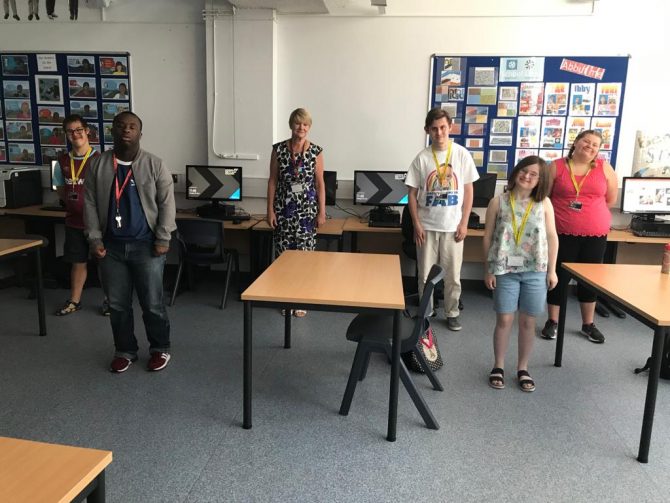10 key workers share their experience of working and learning as they kept the UK going during lockdown, in partnership with Pearson.
Covid-19 has highlighted the crucial role of key workers in society, including those in industries such as health and social care, the supply and distribution of food, utilities, transportation, the emergency services and the armed forces.
FE Week, in partnership with Pearson, wants to celebrate the contribution of these heroes and highlight how colleges and training providers have helped them develop the knowledge, skills and experience they are now using to serve their communities at this unprecedented time.
We spoke to ten critical workers about their roles during the coronavirus pandemic and how further education has prepared them for the crisis.

Susan Miller, registered nurse degree apprentices from Northumbria University and the Newcastle upon Tyne Hospitals NHS Foundation Trust
Miller, 54, completed her 18-month apprenticeship in March and is now working as a registered general adult nurse at the Royal Victoria Infirmary in Newcastle upon Tyne on a ward converted to care for Covid-19 patients. During her first eight weeks, it witnessed 23 deaths, which she said was “emotional and stressful”.
Miller explained the importance of the role. “I would say the nursing job is crucial really because you take a lot of responsibility for patients’ health… [and] the doctors look towards you for extra support.”
Miller has been employed by the trust for 21 years, working her way up from a domestic assistant (cleaner) to her current position.
She praised the apprenticeship programme, which she feels “passionate about”, for developing her ability to keep calm in a crisis environment.
“The lectures actually give you good theory and it marries really well with the practical that you see in the hospital. And without the lecturers I couldn’t have [gone] on the ward and been as confident as I am.”
Toby Roberts, police constable degree apprentice with Nottinghamshire Police
During Covid-19, Roberts, 23, has been deployed in three different departments across the force, the first of which was criminal investigations. After this, he was part of the prisoner-handling team, where a new system had been introduced to limit exposure to the virus.
“There was a significant increase in the amount of Covid-19-related offences coming in, specifically assaults on emergency workers.”
Roberts is now working within neighbourhood policing. “It is important for the police to be enforcing the laws and making sure that the public are safe and feel confident.”
The three-year degree apprenticeship, which he started in September 2018, has allowed him to “understand more about why crime happens” as well as provided awareness of criminological theories and investigative strategies.
After gaining experience in multiple departments, he added: “I’ve been able to gather knowledge from every single one.”
Roberts said the apprenticeship has also taught him to manage his time, be adaptable and always to expect the unexpected. “Covid-19 was definitely something that changed the whole world but, because I’m used to different changes every day, it didn’t shock me that much because I was ready for it.”
Darbie Hughes, level 3 craftsperson apprenticeship with UK Power Networks
Hughes, 23, completed her apprenticeship with the employer provider last year and is now an electrical extra-high-voltage fitter helping to maintain different types of equipment at sub-stations across Sussex and Kent to prevent power cuts.
She said: “Although [people] may not initially think of the power industry as key workers, it is nice to know you are doing your bit.”
The utilities worker claimed the best example of why her job is important at this time is that doctors and nurses rely on electricity. “We need to do our job so they can do their job.”
Hughes said her apprenticeship “hammered home the importance of safety” and a gold Duke of Edinburgh award, which apprentices completed alongside their programme and received from Prince Edward, developed her resilience and taught everyone how to work as a team. “We’re using the knowledge that we’ve learned to find any problems before they become a problem.”
She added: “I think that, although it has been quite a scary time, it has been nice to know you are going out there and making a difference.”

Alice Pendlebury, Georgia Crowe (centre) and Saranjeet Kaur Soni
Alice Pendlebury, adult support worker level 2 apprentice at Oldham College
Pendlebury, 22, has been deployed to work at Medlock Court care home in Lees, which provides rehabilitation for residents after they have been in hospital, as part of her rotational programme with care and support provider MioCare.
“It gets them back on their feet, back home, where they want to be. It’s just a really lovely job to have.”
She has to wear a full set of personal protective equipment while currently working three days a week. Her shifts involve general care, which can range from getting residents in and out of bed, to socially distanced activities and dinner.
Pendlebury said: “I love going in for a chat with them sometimes because they are all isolating in their bedrooms.”
Pendlebury’s apprenticeship helped her prepare for this role by emphasising a duty of care, safeguarding and safe methods for manual handling. “I’d say my communication has also improved a lot.”
She started her apprenticeship last summer and is due to finish in October. “I’m feeling proud of everyone working, especially all through the pandemic. It has been stressful at times but we’ve got through it as a team.”
Georgia Crowe, BTEC level 3 extended diploma in business student at Halesowen College
Crowe, 19, has been working at supermarket Sainsbury’s throughout the pandemic to ensure local residents are still able to buy the essentials. She has helped ensure floor markings, signage and customer-level controls are being adhered to, as well as social distancing and the regular cleaning of surfaces to ensure there is no risk of contamination.
“It has been a lot busier than we first anticipated,” she says.
She mainly works on the checkouts, which are protected by screens, but she is also the public relations ambassador for the Wombourne store, in south Staffordshire, and manages its social media pages.
“It has been very surreal but really rewarding, as well, to be part of people’s Covid-19 journey.”
The team decided to deliver 100 care packages containing necessities such as pasta, tinned goods and toilet rolls to the local community. “Some of them were just so grateful and they were in tears. With a few of them, we had a good cry, me included.”
Crowe says her studies help prepared her for working during a pandemic by developing her interest in marketing as well as improving her customer service skills and understanding of the way the business runs.
She said that the coronavirus has showed how much people rely on supermarkets. “I had some customers who had been isolating for ten weeks and we were the first people they’d seen in that period of time, and it is amazing – that is what we are there for.”
Saranjeet Kaur Soni, dental nursing apprentice at Uxbridge College
Kaur Soni has been working up to seven days a week at a practice which was selected as an urgent care hub and has remained open during lockdown.
She said: “I’m feeling proud of myself that I’m there in this crisis to help our patients and any patients around London.”
The dental surgery has received 50 to 60 referrals every day and, without the service, Kaur Soni explained “people would be suffering from toothache, which is really unbearable”. Her team has received chocolates and promises to clap on Thursday evenings in recognition of their work.
The apprentice has been wearing double or triple layers of PPE, including masks, gloves, a gown and apron, a visor and cap and shoe coverings throughout her shifts which involve checking the medical history of patients, passing instruments to the dentist during procedures as well as disinfecting tools and cleaning the surgery after appointments.
Kaur Soni said that support of her tutor developed her confidence and communication skills. “When someone is there to push you, and you make progress, then that makes you stronger as well,” she added. “My apprenticeship really helped me a lot.”

Private Kai Weir, Chloe Timperley (centre) and Clare Ramsbottom
Private Kai Weir, logistics supply apprentice in the British Army
Weir, 18, has been deployed to a walk-in mobile testing unit in Leicester during the pandemic at which up to 200 people are tested for Covid-19 a day.
He helps facilitate the general public to perform the test on themselves and walks them through step-by-step if necessary. “I get a lot of questions because they’re quite confused and scared.”
He started his class three apprenticeship in November 2019 and was originally due to move to the next class in February. The training taught him about “dealing with a lot of people, keeping everyone calm and reassured”.
Other skills Weir has picked up include working with hazardous items and ensuring kit does not get mixed up to avoid the wrong results. “Safety comes into play.”
During Weir’s shift he has to wear a face mask and gloves and must follow the correct technique while changing PPE. His other tasks during this period have included dealing with large quantities of kit and prepping vehicles to go out to mobile testing units.
Chloe Timperley, VTCT level 3 advanced professional cookery at Truro and Penwith College
Timperley, 19, is volunteering at Hillcrest House nursing home in Cornwall, to help out during the pandemic. She works one or two shifts a week in the kitchen preparing meals and stocking up on food supplies for the elderly residents.
Her role involves “trying to keep them as safe as possible, especially during this time” and “just making sure they are cared for”.
Timperley started the level 3 in September and is due to finish next week.
“College has definitely helped me.” She said her course meant that it was “quite easy to be able to adapt to looking after and feeding different people”.
She has also been applying transferrable skills developed during her work placement at a pub to be able to cater for the different needs.
“I’ve just quite enjoyed being able to help and feel like I’m giving back to the community.”
Timperley received training on the use of PPE but noted wearing a mask has made it more difficult to communicate in the kitchen.
Rhona Sapsford, assistant principal for SEND, London South East Colleges
Sapsford has been in charge of the FE provider’s Bexley campus, which has remained open since the outbreak for vulnerable learners and the children of key workers. It first only had one vulnerable learner coming in at the start of lockdown but this grew to 25 – the majority of whom are on individual personalised timetables – by the time of the wider reopening last week.

Rhona Sapsford (centre) and some of her students
“Initially at the point of lockdown you do take a little sharp intake of breath because we didn’t know what was happening, but once you’re in work… by the end of it, it becomes the norm.”
The department has also been completing annual reviews of students’ education and healthcare plans and assessing whether they can meet the needs of students wanting to join in September.
Sapsford said she was “always there for giving guidance and support” to the original team of four teachers who were coming on to campus, which she described as a “little family”.
The college had protocols such as temperature checks, signage for social distancing, hand sanitiser and cleaning stations in place. “I’m really proud because we never shut down in Bexley and we’ve had absolutely no cases.”
Clare Ramsbottom, apprentice development coach, Seetec Group
Ramsbottom has been continuing to remotely train 50 learners on the independent learning provider’s level 3 international freightforwarding apprenticeship. “These are the young people who are keeping the country going, distributing PPE, bringing in food,” she explained.
Ramsbottom reminds the apprentices they are “an integral part” of the response to Covid-19, with the logistics industry arranging the delivery of stock to hospitals, factories and shops.
She said there has been a few early starts and late finishes but “it doesn’t feel like a job. I absolutely love what I do.”
Ramsbottom has had to adapt her work so now schedules video calls with learners, checks in with their managers and puts on “bitesize” days with regular mini-tasks such as workbooks or 30-minute online courses issued along the way.
She has also been “putting in extra time so that I can learn about the functional skill side and help my learners when it comes to maths and English”.
Ramsbottom started as an apprentice herself 27 years ago. She says that to now “be able to see the learners, who are also so passionate about it – it’s fantastic. It has come full circle.”
Susan Miller, Toby Roberts and Darbie Hughes are pictured in the featured image.
Credits: https://feweek.co.uk/2020/06/26/recognising-fes-role-in-equipping-our-key-workers/
Reporter: Yasemin Craggs Mersinoglu













.png?ext=.png)






.png?ext=.png)

.png?ext=.png)




-4000px-(2).png?ext=.png)




